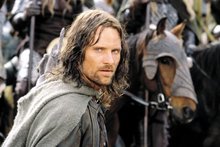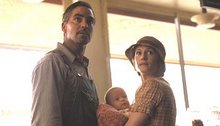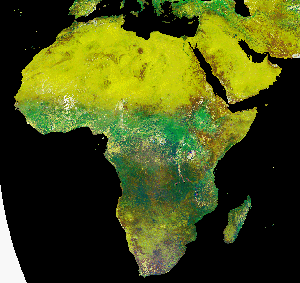We had an amazing speaker in Comparative Politics today. He was from CAPPS - the Center for African Policy & Peace Strategy - a non-profit thinktank that specializes in policy research, advocacy, and capacity building in Africa. He was talking about Africa's role on the global stage... and several things stuck out at me.
First, that until the 1950s this so-called role was essentially boiled down to colonization and slavery. My colonial angst responds instinctively to this. As he said, we have to deal with this history - the fact is colonization shaped Africa (along with basically all other developing countries) - it created the bad governance that dominated Africa's independent early years, it left behind the weak infrastructure that has not allowed even good-natured governments to provide properly for their citizens, it created the basis for the relationship between Africa and the West, a relationship that obviously everybody's trying to move past but can't quite seem to let go of. I think a lot of people, especially a lot of first-world-ers, like to say that "colonialism doesn't explain everything" - they want former colonies to start taking responsibility for themselves and not blame all their problems on their former penjajak, so to speak, and I admit, as did our speaker, that it is highly necessary for these countries to take responsibility and make their own decisions and implement these decisions, to plan their own futures with the interest of their own people at heart, but when more of your country's history is as a colony than as an independent sovereign state, you cannot ignore the impact of colonization. Furthermore, when so many current trends mirror colonization (or at least, marginalization), it's obvious that you're not the only ones unable to give up the role-playing that colonization encourages.
Second, "basket case theory". I admit that I suffer from this ailment, and now I feel very guilty for it. He talked about how Africa is always depicted as the emaciated child surrounded by flies, and while it's good that Africa is portrayed at all, movies like The Constant Gardener and Hotel Rwanda (two of my favorite movies, I'll admit, two movies I thought were very powerful) do not depict the totality of Africa. They encourage "basket case theory", which says, the whole continent's a basket case. They'll never stop killing each other. They'll never stop starving their people. They're hopeless. Of course this does not further efforts to help the continent. If it's all hopeless, then why try? But as our speaker stated, it's not hopeless. With the end of apartheid, Africa's leaders are moving forward (especially in the '90s), slowly but surely. I wish I had been old enough to be an active observer during the Nelson Mandela years, because apparently not only did he rescue South Africa from apartheid, but he broke another kind of "old boys' club" - the African military dictatorship club, where dictators on the continent basically enabled each other to maintain power and keep treating the people like shit. Nelson Mandela refused to honor this tacit principle and started insisting dictatorships like Nigeria's be held accountable by the United Nations. Now regionalism is developing - regionalism that means mutual peacekeeping (The Responsibility to Protect Mandate, something I think every country on the planet should look into) and something abbreviated as APRM - a peer-review for countries (absolutely ingenious. Whoever thought of it should be given a nobel prize, honestly). So yeah. It's not a basket case unless the international community insists upon it.
Third, the incredible inequality in international organizations is frightening. I think what I found most alarming regarding this topic was what he said about the G8 - they're the eight strongest countries in the world, no one can hold them accountable, and they're the largest arms dealers to Africa. It makes me think of Lord of War - of Nicholas Cage just handing out guns to the villagers he crash-lands near to avoid getting caught with them. What the fuck? The first world really needs to get its priorities straight. Does it want to send peacekeepers or guns? Because right now, it's doing both.
Fourth, even the more benevolent people in the first world who really sincerely want to help Africa's poverty plight can't seem to quite get the equation of inequality straight. His example was Live 8, Make Poverty History campaigns that are part of the current mainstream celeb-charity craze. No one really criticizes these campaigns, after all, something you can see even in class when he asked those who had been to Live 8 what they thought (answers: "Yeah, it was good", "it was good energy" - sort of cautious approval). But he did criticize Live 8 because there are never any Africans on stage. Except for the formerly emaciated Ethiopian girl, the "face of poverty", who goes to stand up there to symbolize the suffering. But not exactly any African celebrities or performers, because "they don't sell records". I guess this point was further validated by his point that China and India only get a say in world affairs and international dialogue now because they are economic powers. Good reason to minor in economics even though it's the science of the devil, eh.
Kseniya and I went up at the end of his presentation to thank him for coming and try to express how humbled we felt by what was really a searing indictment of the international community's method of dealing with Africa. The general conclusion is, we (the G8, the celebrities, the voters, all of us) don't know what the hell we're doing. Ugh. It makes me want to go to Africa even more. I feel like with Professor Beck, the resident Africanist at Barnard's poli sci department, leaving -- well, it's not like I even have a chance to get the distant cold knife of studying Africa from afar. I'm still stuck with the illusions-of-Africa books in English: Heart of Darkness, Things Fall Apart... great books, both of them, as literature, as history that deserves a voice in the present. But as much as we need to respect history, we also need to respect Africa today, Africa not as a symbol of our colonial guilt, Africa not as a symbol of darkness or dismay, Africa not as a token colony, Africa not as tribal warfare. But Africa as...
That's just it. Fill in the blank yourself with what you find, is all I have to say. As I learned from Roald Dahl's book The BFG, the blank pages at the ends of atlases are for the countries that haven't been discovered yet, and you have to fill them in yourself. One wonders if we have to rediscover Africa.
The Centre for African Policy and Peace Strategy
The New Partnership for Africa's Development
The Commission for Africa's Report, "Our Common Interest"
skip to main |
skip to sidebar


That's Mr. Kaneda to you, punk!


Everyone, just... pretend to be normal.

You will suffer me.


Lots of respectable people have been hit by trains!

No, I am merely stating that uh... life finds a way.


Gee, I wish we had one of them doomsday machines.

when the wind is southerly, i know a hawk from a handsaw
About Me
The Creatrix

What's Happenin'
Straight to Hell
Brain Stew
The Speed of Sound
Whatever Gets You Through Today
I Still Haven't Found What I'm Looking For
Akira

That's Mr. Kaneda to you, punk!
Kitty With A Tommy Gun

What's That Smell in the Kitchen? - Marge Piercy
All over America women are burning dinners. It's lambchops in Peoria; it's haddock in Providence; it's steak in Chicago tofu delight in Big Sur; red rice and beans in Dallas. All over America women are burning food they're supposed to bring with calico smile on platters glittering like wax. Anger sputters in her brainpan, confined but spewing out missiles of hot fat. Carbonized despair presses like a clinker from a barbecue against the back of her eyes. If she wants to grill anything, it's her husband spitted over a slow fire. If she wants to serve him anything it's a dead rat with a bomb in its belly ticking like the heart of an insomniac. Her life is cooked and digested, nothing but leftovers in Tupperware. Look, she says, once I was roast duck on your platter with parsley but now I am Spam. Burning dinner is not incompetence but war.
Little Miss Sunshine

Everyone, just... pretend to be normal.
Lord of the Rings

You will suffer me.
Poetry

Stopping By Woods on a Snowy Evening - Robert Frost
Whose woods these are I think I know.
His house is in the village, though;
He will not see me stopping here
To watch his woods fill up with snow.
My little horse must think it queer
To stop without a farmhouse near
Between the woods and frozen lake
The darkest evening of the year.
He gives his harness bells a shake
To ask if there is some mistake.
The only other sound's the sweep
Of easy wind and downy flake.
The woods are lovely, dark, and deep,
But I have promises to keep,
And miles to go before I sleep,
And miles to go before I sleep.
O Brother Where Art Thou

Lots of respectable people have been hit by trains!
Jurassic Park

No, I am merely stating that uh... life finds a way.
Emily The Strange

Dr. Strangelove

Gee, I wish we had one of them doomsday machines.
Scheherazade

Don't Panic, Little Stargazer belongs to sri angry angel.
: love love is a verb love is a doing verb : so fragile yet so devious : disdainful and curious : give me life give me pain give me my self again : i'm a firestarter twisted firestarter i'm the bitch you hated filth infatuated yeah : love of colors sounds and words is it a blessing or a curse : are you a part of the cure or are you part of the disease : i fought the war i fought the war i fought the war but the war won : wake up and face me don't play dead cuz maybe someday i will walk away and say you fucking disappoint me : you don't have to love me you don't even have to like me but you will respect me : don't let the walls cave in on you : sleeping in is giving in no matter what the time is : over there stands my angry angel and he's frowning like hell but i'm not feeling guilty :



